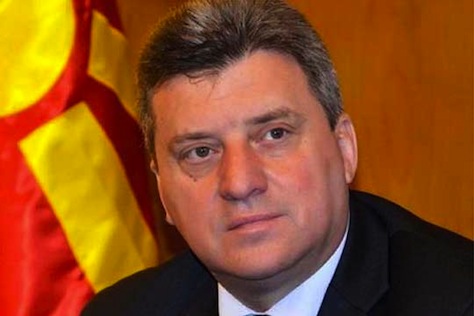It wasn’t a surprise, but Macedonia’s conservative president Gjorge Ivanov (pictured above) won reelection to a second four-year term in Sunday’s elections, and its conservative prime minister Nikola Gruevski won a fourth consecutive term, with his ruling party making minor gains in the Macedonian parliament that they’ve controlled since 2006.![]()
Gruevski’s ruling VMRO-DPMNE (Внатрешна македонска револуционерна организација – Демократска партија за македонско национално единство; Internal Macedonian Revolutionary Organization – Democratic Party for Macedonian National Unity) actually improved their total from 56 seats to 61 seats, nearly a majority in the 123-seat Собрание (Sobranie), the country’s unicameral assembly.
* * * * *
RELATED: Macedonian right seems headed for fourth consecutive win
* * * * *
Despite a high-profile call to boycott the presidential vote in the first round by the country’s ethnic Albanians, an issue that initially brought the government down when
Gruevski’s junior coalition partner, the Democratic Union for Integration (DUI, Bashkimi Demokratik për Integrim), brought the government down earlier this spring over the issue of Ivanov’s reelection. Despite a high-profile call to boycott the presidential vote in the first round by the country’s ethnic Albanians, the DUI also improved its standing from 15 to 19 seats, and it will likely resume its place in government.
The opposition Social Democratic Union of Macedonia (SDSM, Социјалдемократски сојуз на Македонија) lost ground, dropping eight seats to just 34. 
Gruevski has presided over a relatively strong economy by any regional standards. Compared to, say, Bosnia-Herzegovina or even Serbia, Macedonia is much less corrupt, according to Transparency International’s latest corruption perception index. By and large, its economy has grown under Gruevski — at growth rates that look strong compared to the rest of the anemic eurozone’s performance. But its GDP growth is still probably too low for an emerging economy like Macedonia’s. Its unemployment, though it’s dropped from a staggering high of 38%, is still around 29%, and its public debt is rising as a result of spending on state-sponsored jobs and other questionable projects.
Gruevski has effectively rallied Macedonians with a heavily nationalist populism that has transformed Skopje, the capital, into a veritable shrine to Alexander the Great, which hasn’t gone down well in Athens — a running spat with Greece over the name ‘Macedonia’ has kept Macedonia out of the European Union.
Ivanov, whose role is largely ceremonial under the Macedonian constitution, defeated the SDSM’s Stevo Pendarovski in the second round by a margin of 55.28% to 41.14%.
